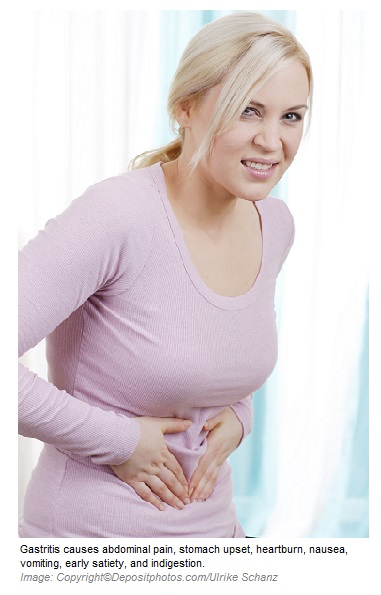Gastritis is inflammation of the stomach characterized by abdominal pain, stomach  upset, heartburn, nausea, vomiting, bloating, early satiety, feeling full, poor digestion, and sometimes bleeding. Gastritis has been classified into acute and chronic groups.
upset, heartburn, nausea, vomiting, bloating, early satiety, feeling full, poor digestion, and sometimes bleeding. Gastritis has been classified into acute and chronic groups.
Contributing factors for developing gastritis:
- Infections:
- Helicobacter Pylori (the most common cause of acute gastritis).
- Viral.
- Fungal.
- Parasitic.
- Syphilitic.
- Stress-induced (erosive gastritis):
- Head trauma (Cushing`s ulcer).
- Severe burns (Curling`s ulcer).
- Shock.
- Severe systemic infection (sepsis).
- Autoimmune (atrophic gastritis).
- Alcohol.
- Aspirin.
- Non-steroidal anti-inflammatory drugs (NSAIDs), such as Advil (Ibuprofen).
- Medical conditions: Crohn`s disease, Sarcoidosis, and Ménétrier’s disease.
- Nutritional factors:
- Iron supplementation.
- Zinc supplementation.
- Coffee.
- Chronic bile reflux.
- Surgical removal of a part of the stomach.
- Ingestion of corrosive agents.
- Irradiation.
Nutritional Supports:
Restricted Foods:
- Fatty foods: butter, margarine, sausage, bacon, cheese and sauces.
- Processed meats.
- Tomato and tomato-based foods such tomato paste, tomato juice, and pasta sauce.
- Fried foods: French fries.
- Potato chips.
- Omelets and scrambled eggs.
- Onion and onion rings.
- Garlic and foods containing garlic.
- Egg rolls.
- Dairy products.
- Peppermint.
- Spearmint.
- Minty foods.
- Chocolate.
- Alcohol.
- Coffee, teas, cola, and cocoa.
- Caffeinated and carbonated beverages.
- Spicy foods.
- Black and red pepper.
- Chili powder.
- Hot pepper.
- Citrus fruits.
- Gas-forming foods: beans, cabbage, broccoli and onions.
Recommended Foods:
- Plain water: at least 2 liters a day. Water can dilute stomach acid and reduce symptoms.
- Whole grains.
- Fresh fruits and vegetables except citrus fruits.
- Flaxseeds.
- Flaxseed oil.
- Pineapple.
- Papaya.
- Fruits and vegetables high in mucilage: jujube, aloe vera, chia seeds, flaxseeds, kelp, marshmallow, okra, and psyllium. Mucilage is a glycoprotein that has healing and anti-inflammatory activities in the gastrointestinal system by covering the mucous membranes and protecting them from getting irritated.
- Chamomile tea.
- Ginger.
- Artichoke.
Recommended Supplements:
- Licorice in the form of DGL (de-glycyrrhizinated licorice): 200 – 300 mg tablet chewed before each meal and before bed. Licorice alleviates irritation and heals inflammation.
- Aloe Vera juice: ¼ – ½ cup three times a day. It has soothing and healing effects.
- Digestive Enzymes: A full spectrum product.
- Probiotics: a product that provides 5 to 10 billion organisms per serving.
- Gamma Oryzanol: 300 mg a day. It is a plant sterol that helps heal gastritis.
- NAC (N – acetyl cysteine): 500 – 1000 mg a day. It is a powerful antioxidant and mucolytic agent that may help heal gastritis.
- Bladderwrack: as capsules 200 – 600 mg a day, as tincture 2 – 3 ml a day, or as a tea 1 teaspoon of dried form per one cup of hot water for three times a day. It is a type of seaweed with active ingredients iodine, alginic acid and fucoidan that soothes heartburn and heals gastritis and esophagitis.
- Artichoke Extract: 500 – 1000 mg a day. An active compound of artichoke is cynarine, which stimulates biliary secretion, improves the function of the gallbladder, and relieves mild indigestion.
- Slippery Elm Bark: as a dried form 2 – 4 grams a day, or as a tincture 9 – 12 ml a day. Slippery elm contains mucilage that soothes heartburn and speeds up healing.
- French Maritime Pine Bark Extract: 200 – 300 mg a day. It is a flavonoid with antioxidant, anti-inflammatory, and blood flow-enhancing properties.
- Grape Seed Extract: 100 – 200 mg a day.

